Two sisters working towards reviving Odisha’s handicrafts are also skilling prisoners in Baripada jail
Ecommerce platform KalaGhar works with artisans to adapt to trends and helps them find a market for their beautiful, timeless products.
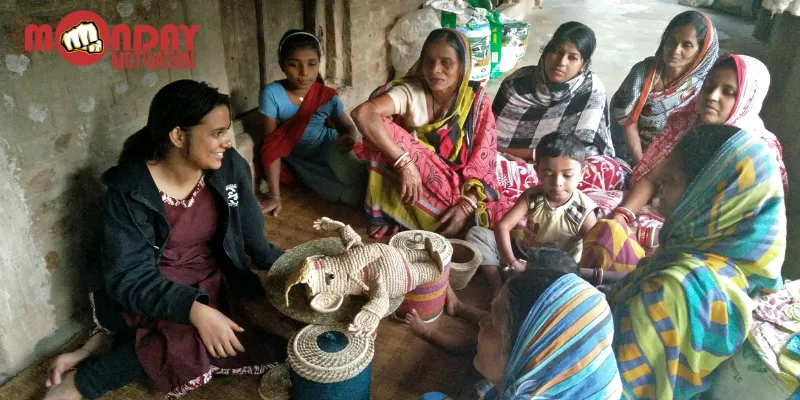
If you love handicrafts and art, Odisha is the place for you. From appliqué works of Pipili, intricately patterned pattachitra paintings, delicate silver filigree jewellery, horn work of Paralakhemundi, to the tribal dhokra figurines or the baskets made from sabai grass weaving, there is plenty to choose from.
But the over 1.3 lakh artisans in the state are not given their due, and the trade comes with a lot of challenges. This was noticed by sisters Megha and Shipra Agarwal.
“With large production houses adopting modernisation in their techniques, the handicraft sector is languishing. To begin with, the sector is unorganised and has poor exposure to new technologies. This is why it is unable to compete with other organised sectors. In the absence of marketing facilities, poor infrastructure and institutional framework, growth of the sector is paralysed,” 29-year-old Shipra says.
So to positively impact the craft market of Odisha, the sisters founded KalaGhar in 2016. The ecommerce platform was inspired by the concept of ‘arte util’, which means useful art in Spanish. Through their initiative, they hope to revive the handicraft industry of Odisha, Chhattisgarh and West Bengal with new product ideas and designs.
Their goal is also to improve the financial standing of Sabai artisans in Mayurbhanj district, which is home to 45 tribal communities, and where the per capita income is 43 percent below the national average. The sisters not only help the artisans develop their products but also help them understand designs and trends as well as engage them in new product development ideas.
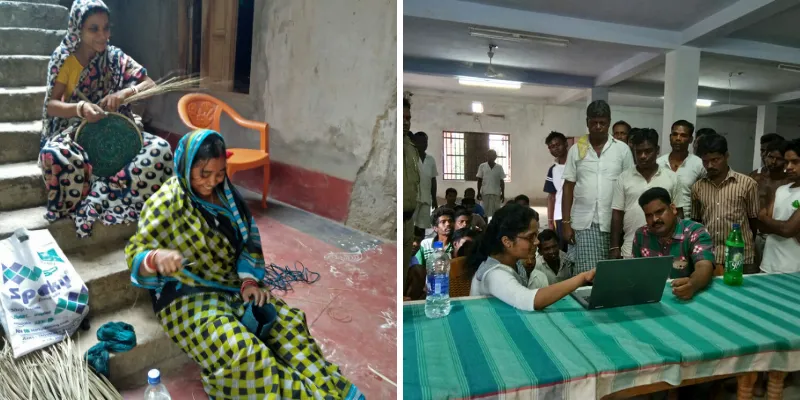
The sisters took their commitment to the cause to another level by collaborating with Baripada jail in Mayurbhanj district, and conducted a seven-day workshop on Sabai weaving for the prisoners there. At present, they are working with 25 artisans and aim to add 25 more by 2020.
The beginnings
Coming from a Marwari family, business, one could say, ran in their blood. But the sisters were clear from the beginning about building a company that created social value. While Megha was doing her internship with Milaap, an online micro-lending startup, she got talking to Shipra about small self-help groups (SHG) and rural artisans and the struggles they faced while selling their products due to their lack of exposure to new technologies and trends.
These discussions gave birth to the idea of starting something that combines the skills of SHGs, NGOs and artisans with the aesthetic sense of new-generation designers.
“We are located in the culturally rich state of Odisha. The state boasts of the oldest art forms in the country. Having been raised here we get the benefit of having a better understanding of the state’s culture and nuances. It also puts us in a stronger position to maintain a transparent feedback within our supply chain,” Megha says.
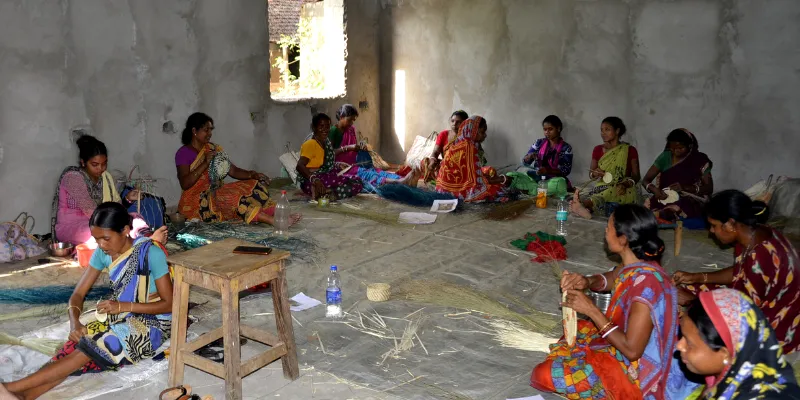
Focusing on dhokra and organic sabai (dried fibre) grass products, the startup primarily works with artisans from Dhenkanal, Baripada and Baliapal in Odisha. Through their startup they are scaling the design and bridging the knowledge gap between market demand and production. Through research and quality control, they are also bringing in standardisation in the handicrafts section and reducing the payment gateway to a week, by connecting with consumers through their e-commerce portal. Their focus is on quality of change rather than the quantity.
Reviving dhokra
While there are multiple startups like MITHILAsmita, iTokri, and Thoomri that are working with rural artisans and connecting them with consumers, Megha says that KalaGhar goes beyond just facilitating market linkage.
“The differentiating factor about us in the space is attention to process innovation in development of our products and services. With course of time we have become very close to the artisans and NGOs we work with,” Shipra explains.
One of their innovative products is the rakhi made of dhokra, which is an alloy of brass, zinc and nickel, and is made using the wax casting technique, one of the earliest known casting techniques. The rakhi collection was the sisters' attempt to break the monotony of plastic, and bring back the charm of handcrafted rakhis.
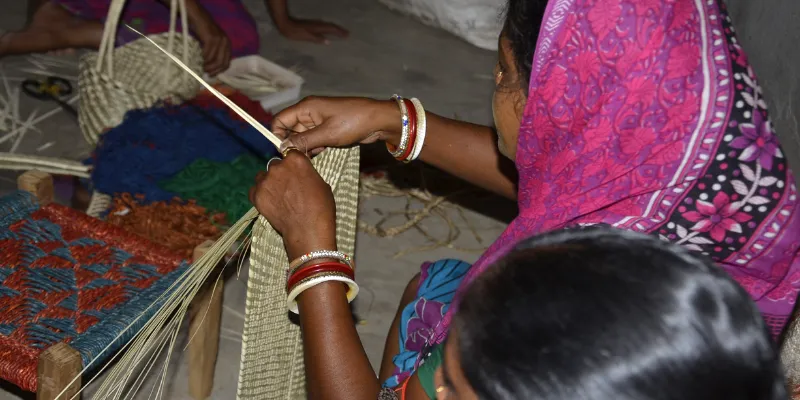
KalaGhar is working hard to revive the Indus Valley civilisation art form of dhokra for mass appeal and usage through decorative pen stands, earrings, wall decor, bracelets and other jewellery.
Creating impact
Often called the ‘money plant’ of the Odisha tribes, crafts made using the sabai grass provides year-round income for the local craftspeople.
“The artisans of Mayurbhanj work diligently to twist the home-grown sabai grass into fine pieces of art or an array of utility products like baskets, trays and drums,” Megha explains.
This 5,000-year-old craft form has also become a source for rehabilitation and reform and correction for prisoners in Baripada Circle Jail for the past five decades.
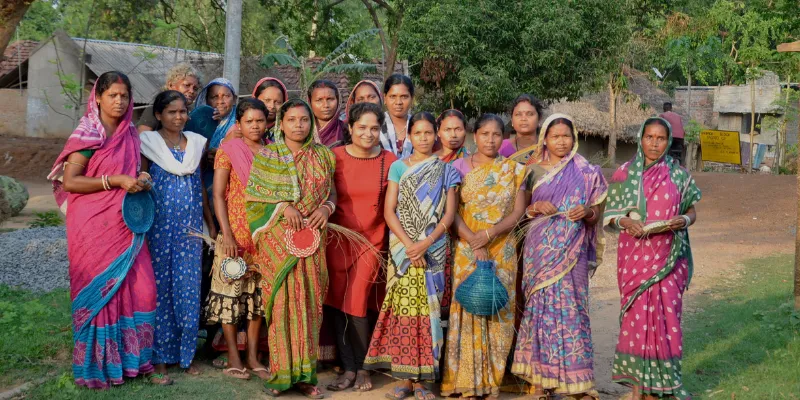
Through its collaboration, KalaGhar worked with prisoners to teach them new designs and product techniques. Megha recalls how one prisoner crafted products based on designs he had seen on a newspaper wrapped around snacks.
“We are positive that with the government’s continued efforts towards crafts development, Odisha will create a niche place for itself in the crafts sector,” Shipra says.
KalaGhar plans to conduct more workshops with Baripada jail and promote their innovative initiative for prisoners’ engagement through crafts.
Plans ahead
With an aim to create Made in India world-class art-based utility products with a touch of heritage and luxury, KalaGhar’s long-term vision is to create a business sustainable enough to build an ecosystem that provides amenities like quality primary education and basic health services for artisans and their families.
“Our online marketplace is functional and profitable at the moment. We are hoping to enter the international market in the coming year and establish a strong B2B network through customised designing for our clients,” Megha adds.







